Alberta
Open letter to Canadians opposing Canadian pipelines and oilsands

Demian Newman is President of Newman Sales and Marketing Inc. based in Calgary.
Dear fellow Canadians,
I’m writing this as an open letter to every Canadian who has protested the Canadian oil and gas industry. I’m writing this to ask – what if you win? What if you succeed and completely shut down Canada’s oil and gas industry? What happens next?
Obviously, if you’ve ever marched, protested or argued against Canadian pipelines or Oilsands, you must believe that you are financially insulated from the hundreds of billions this industry puts into the Canadian economy. Or you are OK with the crushing blow to the Canadian economy, because your heartfelt belief is that the Canadian oil and gas industry is so environmentally bad for the planet.
These are the people I desperately want to have a conversation with.
I write this letter, not as a Calgarian, Albertan, or even as a Canadian. But I write this as a human being. A human being with two young children, and one who doesn’t go a day without being concerned about how we’re leaving this planet.
So, let’s say that all the anti-Canadian pipeline and oilsands campaigns finally crippled this industry, to a point it can’t rebound. Which feels like a real possibility these days. But what is not just a possibility, but a reality, is that Canadians without their own oil and gas industry would still consume the same amount of energy.
And as Canadians continue to consume 1.5 million barrels of oil per day, the amount we need to import from foreign countries would rise from the current 56%, to 100%. And as completely confused as I already am that we currently import 850,000+ barrels of oil per day, while having the 4th largest reserves in the world. I have absolutely no idea how anyone can think importing an additional 650,000 barrels a day is better for Canada or the environment?
Let’s start with where it’s coming from, with Canada importing 61% from the US, 12% from Saudi Arabia, 6% from Azerbaijan, 5% from Norway, and 4% from Nigeria. I’m going to skip past each of these countries environmental, safety, employee and human rights track records, as there’s no point defacing them when Canada’s oil and gas industry is the world leader in all of these. And I’ll expand on this later, but I thought for arguments sake, we can pretend all these countries have the same standards as Canada.
How could it possibly be more environmentally positive to drill oil in the Middle East, pipeline it to their ports, tanker it 10,000+kms across the ocean, and then deliver it to Canada? Remembering that we have it right here.
So, you’ve won, and there’s no more of what you believe is “dirty oil”. And now we’re importing an additional 650,000 barrels a day into Canada. Let’s not forget, that the 5% of the world’s oil production which Canada currently produces daily, would need to be replaced, or prices would inflate and everyone across the globe would have to pay more at the pumps. And more for the 1,000’s of items manufactured from oil.
But don’t worry about the extra cost, as no other country has an anti oil industry campaign against them, that has stopped or slowed them down like Canada has. And with technology getting better every day, Canada’s 5% worldwide production amounts will be easily replaced.
And let’s go full circle to the Canadian’s protesting new Canadian pipeline projects. If we eliminate our own industry, and we’re importing 650,000 extra barrels of oil daily, we’ll have no other choice but to build new pipelines and facilities to bring this additional oil from the US pipelines and foreign tankers.
So, wouldn’t that be an ironic punch in the face. Where Canadians protesting Canadian owned and operated pipelines, end up shutting down all the investment it takes to move Canadian resources through Canadian pipelines. Just so we are forced to build pipelines and facilities to move more foreign oil into Canada.
And I mentioned that we’d pretend all countries have the same environmental requirements and standards when exploring and developing their natural resources. But it isn’t even close.
You can Google articles with examples of Canada’s environmental standards in this industry, versus any other country. But instead, do yourself a favour and ask someone who’s worked in Canada’s oilpatch, and around the world. Every one of them has countless stories of horrendous environmental issues abroad, which haven’t been allowed in Canada in 30+years (or ever).
So, let’s look at what Canada’s environmental standards are for this industry. And by that, I mean you should go look it up. Don’t take my word for it, but find some reputable publications and factual documents, and not someone’s rambling blog.
Look it up, and please let me know if I’m wrong. Because as much as I needed to write this letter, to get a few things off my chest. I also wrote it, as I believe everyone needs to do better at having a conversation about climate change, the environment, and our responsibility to all do better.
So, I welcome the opposing opinion, as I don’t know why this topic has become a name calling divisive shouting match, where no one will listen to the other side.
But while I have you here, I did want to throw out a couple specific projects, and how protesting them doesn’t make any environmental sense to me. One is Energy East, and the other is BC LNG. The first one is dead, but my fingers are crossed that it can be revived. The second is still approved, for now.
If you look at a map of Canadian pipelines, there is no major pipeline going from Alberta to the east coast of Canada. This means that almost every drop of gas in every vehicle east of Winnipeg is from refined foreign oil. The amount of oil that would’ve travelled on the Energy East pipeline is almost the same amount of oil that we import from Saudi Arabia every day (roughly 100,000 barrels a day).
But what if we didn’t protest Energy East, and instead told the Premier of Quebec that he cannot block a national pipeline. Eastern Canadians would’ve paid (at a minimum) $10-$15 less per barrel than they are currently paying for Canadian oil versus foreign oil. But there was also the billions (not millions, but billions) in revenue that each province would receive from this pipeline running oil through their province.
And I know we’re focusing on the environment, and not the financial benefits of Canada’s oil and gas industry. But, the trick with clean energy and technology, is that it takes money to develop and get to market. So I could be wrong, but I’m almost certain that not one oil company would’ve been upset if Quebec hadn’t killed this pipeline, but instead, took their multi billions a year in revenue from it, and invested all of it into new clean energy technology.
Another thing I encourage you to Google, is the amount of new clean energy technology that has been developed by, and for, Canada’s oil and gas industry.
So, Energy East would’ve taken the amount of Canadian oil, which they are already buying from foreign countries, while generating a ton of money for Canada/Canadians. And then that money could’ve been invested into renewable green energy development. But, Climate Change is a world wide problem, not just a Canadian one. So, as crazy as this might sound, I do believe that BC building facilities to ship Canadian liquid natural gas (LNG) to the world, could have an incredibly positive carbon emissions net benefit.
Currently, China alone has over 700 super coal plants. Just one of them emitting almost as much CO2 as the entire Canadian Oilsands (this is easy to look up). So, what if we could help China get their energy from Natural Gas instead of Coal, as it’s WAY better for the environment. (Side note – also look up Natural Gas and its carbon footprint, as I find very few people realize that it has been unfairly lumped in as a dirty fossil fuel).
And very quickly, I would like to address how we got here in the first place. Why is the perception of Canada’s oil and gas industry so bad across the rest of Canada?
The industry really must start by looking inward, as it has done a very poor job of promoting itself and the strides it’s made over the years. And it can still improve. As can all of us individually.
Because who outside of the industry knows that the Oilsands greenhouse gas emissions have dropped 29% since 2000. Or that a barrel of oil sent from the Oilsands to a refinery on the US Golf Coast has a smaller carbon foot print than a barrel of oil traveling from an oil well in California (it’s small difference, but it’s still better).
And to understand why it’s tough for this industry to promote itself – it is Canadian after all, which explains a lot about its uncomfortable feelings towards self-promotion. And I’ve met a ton of extremely intelligent and thoughtful engineers, geologists, accountants, and tradespeople in this industry, but I’ve never met a Public Relations person – and if there is one, they are very underfunded.
Who is not underfunded, are the groups who make an extraordinary amount of money from Canada not being able to get its natural resources to other customers (the US is our biggest customer at 99%, which is a percentage no business can survive with). And you can’t blame these people for making money off Canada’s inability to build pipelines. But, how they’ve done it, by spending hundreds of millions on PR campaigns to smear Canada’s industry, and pitting us against each other, is beyond is infuriating.
If you only look up one item, please do some research on how openly organizations have been about making donations in the name of the environment, which only target one country’s oil industry. This has made a lot of headlines lately, but I’ve read national Canadian media articles investigating this as far back as 2010.
In conclusion, I would like to point out that I tried my best to use as few statistics as possible, as I’ve seen arguments get derailed with debates on stats. As if the $80 million that Canada losses every day due to no pipeline capacity, is any different if its $40 million or $100 million. It’s a lot of millions, that have turned into billions. And it’s costing hundreds of thousands of good hardworking Canadians financial hardship.
And if it saves the environment, and the planet, then there certainly is an argument for it. But if it’s not helping at all, and potentially harming the planet. Then everyone needs to get educated on all the facts and start to talk to each other about a real solution. And get our industries, politicians, and every Canadian on board with a solution that works.
And please, please, please, don’t take your information from this subject off some rogue website, that’s for or against my stance. Take the time to get your facts from vetted and fact checked publications.
No one should get their facts from a nameless person shouting on the internet. So, my name is Demian Newman, and the two kids I’m leaving this planet to are Olivia and Liam. And both of them need to grow up in a country which is thriving as a world leader, both economically and environmentally – as anything less would be un-Canadian.
Sincerely,
Demian Newman
p.s. If you don’t have time to look up information on everything I’ve mentioned above. Here are a few links:
This first one is on personal energy use and personal accountability. Fun fact: If each of us does a better job to minimize our individual carbon footprint, the industries selling it won’t need to produce as much. Scary fact: literally every economist has said we will use more energy each and every year. This article does a good job expanding on that.
https://www.c2cjournal.ca/2018/12/03/we-have-met-the-carbon-enemy-and-he-is-us/
https://www.nrcan.gc.ca/energy/oil-sands/18091
https://ipolitics.ca/2014/07/18/how-clean-is-our-dirty-oil-youd-be-surprised/
Newman Sales and Marketing Inc is a full service sales and marketing firm representing independently owned and operated oilfield service companies.
Originally published January 2019
If you enjoyed this story, you might also like this story from Sheldon Gron. Click the image below:
Alberta
Alberta’s move to ‘activity-based funding’ will improve health care despite naysayer claims

From the Fraser Institute
After the Smith government recently announced its shift to a new approach for funding hospitals, known as “activity-based funding” (ABF), defenders of the status quo in Alberta were quick to argue ABF will not improve health care in the province. Their claims are simply incorrect. In reality, based on the experiences of other better-performing universal health-care systems, ABF will help reduce wait times for Alberta patients and provide better value-for-money for taxpayers.
First, it’s important to understand Alberta is not breaking new ground with this approach. Other developed countries shifted to the ABF model starting in the early 1990s.
Indeed, after years of paying their hospitals a lump-sum annual budget for surgical care (like Alberta currently), other countries with universal health care recognized this form of payment encouraged hospitals to deliver fewer services by turning each patient into a cost to be minimized. The shift to ABF, which compensates hospitals for the actual services they provide, flips the script—hospitals in these countries now see patients as a source of revenue.
In fact, in many universal health-care countries, these reforms began so long ago that some are now on their second or even third generation of ABF, incorporating further innovations to encourage an even greater focus on quality.
For example, in Sweden in the early 1990s, counties that embraced ABF enjoyed a potential cost savings of 13 per cent over non-reforming counties that stuck with budgets. In Stockholm, one study measured an 11 per cent increase in hospital activity overall alongside a 1 per cent decrease in costs following the introduction of ABF. Moreover, according to the study, ABF did not reduce access for older patients or patients with more complex conditions. In England, the shift to ABF in the early to mid-2000s helped increase hospital activity and reduce the cost of care per patient, also without negatively affecting quality of care.
Multi-national studies on the shift to ABF have repeatedly shown increases in the volume of care provided, reduced costs per admission, and (perhaps most importantly for Albertans) shorter wait times. Studies have also shown ABF may lead to improved quality and access to advanced medical technology for patients.
Clearly, the naysayers who claim that ABF is some sort of new or untested reform, or that Albertans are heading down an unknown path with unmanageable and unexpected risks, are at the very least uninformed.
And what of those theoretical drawbacks?
Some critics claim that ABF may encourage faster discharges of patients to reduce costs. But they fail to note this theoretical drawback also exists under the current system where discharging higher-cost patients earlier can reduce the drain on hospital budgets. And crucially, other countries have implemented policies to prevent these types of theoretical drawbacks under ABF, which can inform Alberta’s approach from the start.
Critics also argue that competition between private clinics, or even between clinics and hospitals, is somehow a bad thing. But all of the developed world’s top performing universal health-care systems, with the best outcomes and shortest wait times, include a blend of both public and private care. No one has done it with the naysayers’ fixation on government provision.
And finally, some critics claim that, under ABF, private clinics will simply focus on less-complex procedures for less-complex patients to achieve greater profit, leaving public hospitals to perform more complex and thus costly surgeries. But in fact, private clinics alleviate pressure on the public system, allowing hospitals to dedicate their sophisticated resources to complex cases. To be sure, the government must ensure that complex procedures—no matter where they are performed—must always receive appropriate levels of funding and similarly that less-complex procedures are also appropriately funded. But again, the vast and lengthy experience with ABF in other universal health-care countries can help inform Alberta’s approach, which could then serve as an example for other provinces.
Alberta’s health-care system simply does not deliver for patients, with its painfully long wait times and poor access to physicians and services—despite its massive price tag. With its planned shift to activity-based funding, the province has embarked on a path to better health care, despite any false claims from the naysayers. Now it’s crucial for the Smith government to learn from the experiences of others and get this critical reform right.
2025 Federal Election
Group that added dozens of names to ballot in Poilievre’s riding plans to do it again

From LifeSiteNews
The ‘Longest Ballot Committee’ is looking to run hundreds of protest candidates against Conservative leader Pierre Poilievre in an upcoming by-election in the Alberta.
A group called the “Longest Ballot Committee” is looking to run hundreds of protest candidates against Conservative Party leader Pierre Poilievre in an upcoming by-election in the Alberta Battle River–Crowfoot riding, just like they did in his former Ottawa-area Carelton riding in last week’s election.
The Longest Ballot Committee is a grassroots group that packs ridings with protest candidates and is looking to place 200 names in the Battle River–Crowfoot riding. The riding was won by Conservative-elect MP Damien Kurek who garnered over 80 percent of the vote, but has since said he is going to vacate his seat to allow Poilievre to run a by-election and reclaim his seat in Parliament in a Conservative-safe area.
In an email to its followers, the committee said “dozens and dozens” of volunteers are ready to sign up as candidates for the yet-to-be-called by-election. The initiative follows after the group did the same thing in Poilievre’s former Carelton riding which he lost last Monday, and which saw voters being given an extremely long ballot with 90 candidates.
The group asked people who want to run to send them their legal name and information by May 12, adding that if about 200 people sign up they will “make a long ballot happen.”
-

 Business2 days ago
Business2 days agoCarney pivots from anti American campaign, embracing US and hailing Trump as “transformational president”
-
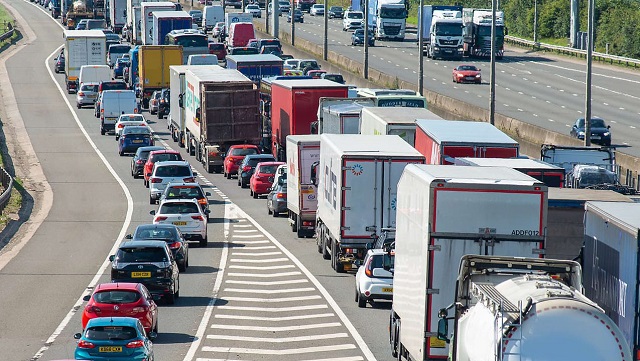
 Daily Caller2 days ago
Daily Caller2 days agoMisguided Climate Policies Create ‘Real Energy Emergency’ And Permit China To Dominate US
-
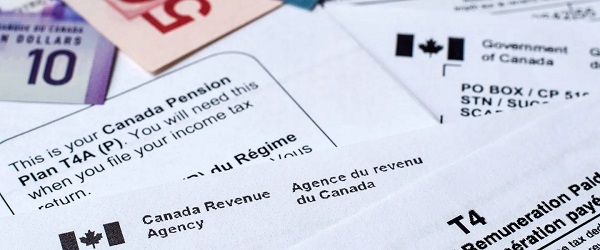
 Business2 days ago
Business2 days agoReality check—Canadians are not getting an income tax cut
-

 International1 day ago
International1 day agoIce Surprises – Arctic and Antarctic Ice Sheets Are Stabilizing and Growing
-
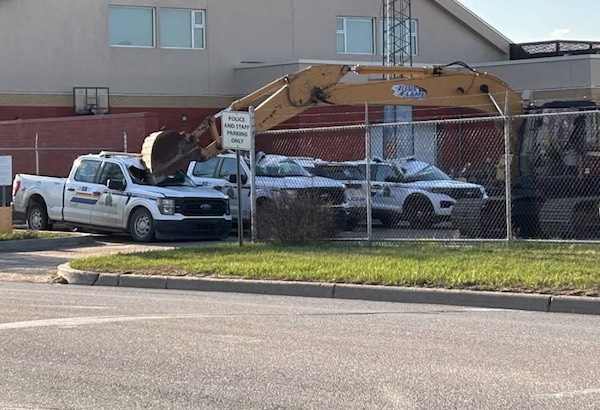
 Alberta2 days ago
Alberta2 days agoBonnyville RCMP targeted by suspect driving a trackhoe – Update
-
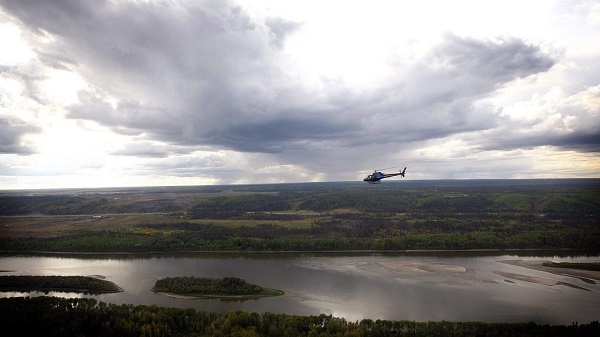
 Alberta1 day ago
Alberta1 day agoEnergy projects occupy less than three per cent of Alberta’s oil sands region, report says
-

 Energy1 day ago
Energy1 day agoCarney’s energy superpower rhetoric falls flat without policy certainty
-
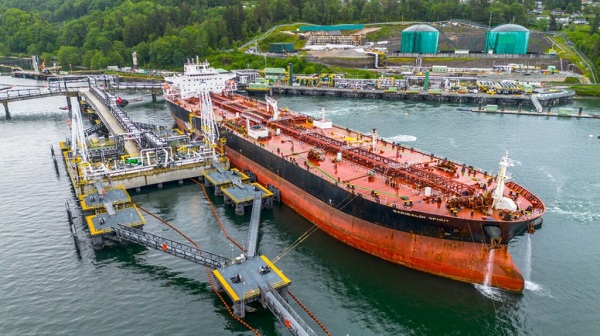
 Energy1 day ago
Energy1 day agoOil tankers in Vancouver are loading plenty, but they can load even more










